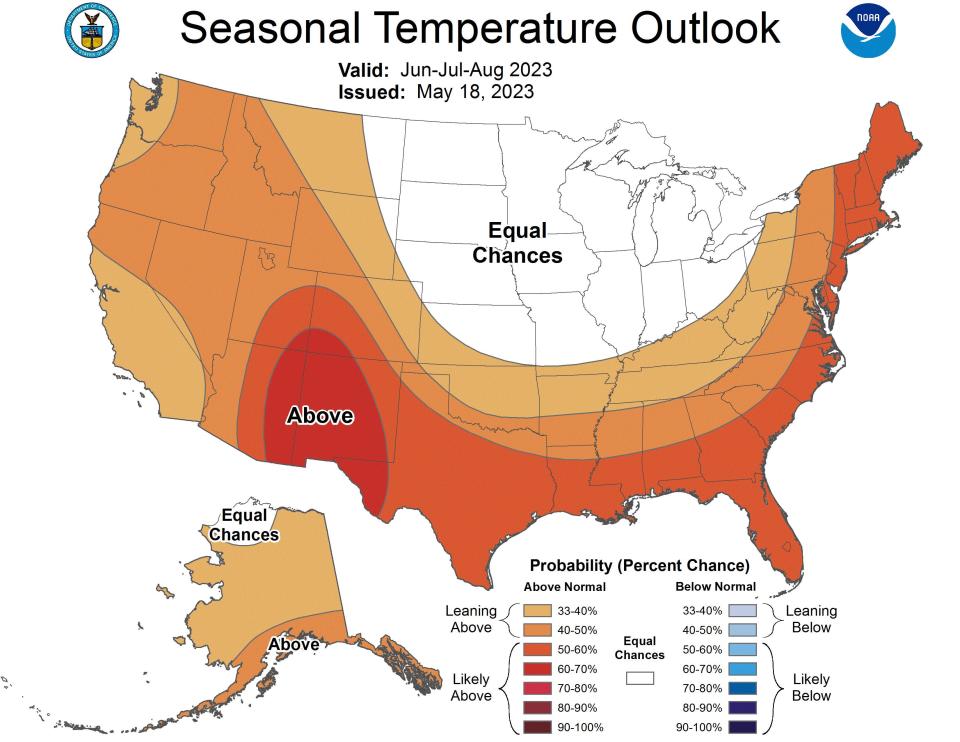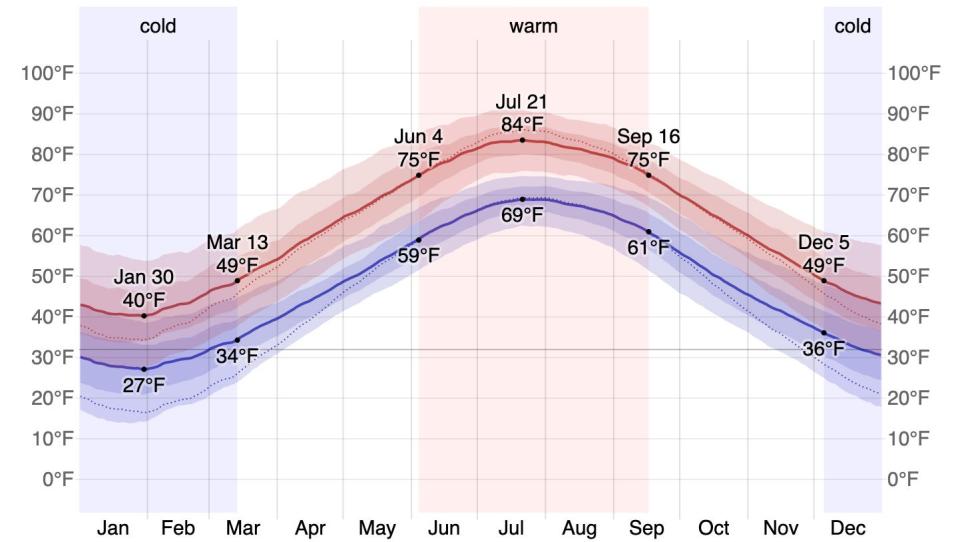Heat is coming: Why 2x as many days will be hot in Asbury Park this summer
Summer should be different this year in Asbury Park, and for many years to come, due to the climate crisis.
The Jersey Shore will be far from the hottest place. The Southwest region of the United States will be hit hard by heat in the coming decades, according to climate modeling. But places like Asbury Park, upstate New York, New England and the Pacific Northwest will at times suffer more thermal shock, as warming slams into people, pets, homes and offices not prepared for it.
"Extreme heat exposure is increasing across the country," said Jeremy Porter, chief research officer for First Street, a Brooklyn, New York, research and technology group.
We saw it last year.
July was the third-warmest on record in the U.S., and the 76.4-degree average temperature was nearly 3 degrees above normal, the National Oceanographic and Atmospheric Administration said. Europe broiled. New England suffered through two heat waves.
HOTTER FORECAST: According to NOAA's most recent seasonal climate forecast from May 18, Asbury Park is likely to have "above normal" temperatures with a 50%-60% chance of higher than typical temperatures for July, August and September this year.

New Jersey will experience twice as many hot days this year
Spending time in heat where the heat index or “feels like” temperature is higher than 90 can be harmful for people, especially those with high-risk conditions. Under more normal conditions three decades ago, the number of days above 90 degrees in Asbury Park would have been about 10 days, according to projections from First Street.
That has doubled. This year in Asbury Park, about 20 days are expected to hit or go higher than 90 degrees.
On those days, it will likely feel even hotter than that in parts of the city that lack vegetation and feature large expanses of cement, glass and metal.
What is the hottest month usually in Asbury Park? July.
According to Weather Spark: "The warm season lasts for 3.4 months, from June 4 to September 16, with an average daily high temperature above 75°F. The hottest month of the year in Asbury Park is July, with an average high of 83°F and low of 68°F."
When it is hot in Asbury Park:

Above, the average high and low temperatures in Asbury Park, per Weather Spark. The daily average high (red line) and low (blue line) temperature, with 25th to 75th and 10th to 90th percentile bands. The thin dotted lines are the corresponding average perceived temperatures.
IMPACT OF CLIMATE CHANGE: There is “literally no question” that heat waves are becoming more intense and more frequent in the U.S. and around the world because of climate change, said Dr. Michael Mann, a presidential distinguished professor in the Department of Earth and Environmental Science at the University of Pennsylvania.
“Sure, heat waves happen naturally,” he said. “But we would not be seeing this record (Northwest) heat wave, or the unprecedented ‘heat dome’ last summer, if not for human-caused warming from fossil fuel burning.”
What is the role of El Niño?
El Niño has returned. That will have a big effect on the weather in the United States and around the world, according to USA TODAY reporting from Doyle Rice.
El Niño is a natural climate pattern in which surface sea water temperatures in the central and eastern tropical Pacific Ocean are warmer than average. It occurs, on average, every 2-7 years.
Its name means the Little Boy, or Christ Child in Spanish. El Niño originally was recognized by fishermen off the coast of South America in the 1600s with the appearance of unusually warm water in the Pacific Ocean around Christmas.
“The onset of El Niño has implications for placing 2023 in the running for warmest year on record when combined with climate-warming background,” said University of Georgia meteorology professor Marshall Shepherd.

Projected increased temperatures in New Jersey
Data from NOAA showed that historically, Monmouth County has experienced an average of 18 days per year with a heat index above 90 degrees.
But New Jersey is one of the most rapidly warming places on the planet.
The First Street risk assessment for Monmouth County says, "30 years ago, the number of days above 90ºF in Monmouth County would have been around 16 days. This year approximately 27 days are expected to reach or exceed 90ºF."
According to the state's climate studies, temperatures in New Jersey have risen more than 3.5 degrees since the beginning of the last century.
"All of the 10 hottest calendar years on record for the state have occurred since 1990, and six have occurred since 2010," said a New Jersey climate report.
Air quality has been impacted before the Shore even heats up
Canada has been dealing with a series of intense wildfires that have spread from the western provinces to Quebec to the tristate area. The wind has carried smoke from the fires south, triggering air-quality alerts throughout the United States, heavily impacting the State of New Jersey.
Fine-particle pollution, known as “PM 2.5” is what’s being measured. The tiny particles are small enough to get past airway defenses and cause breathing problems.
An AQI (air quality index) of less than 50 is considered to be good. From June 6 to June 8, the AQI hit over 300 in Monmouth County and over 400 in the state.
The New Jersey Department of Environmental Protection issued a code orange air quality alert for Monmouth County, signaling unhealthy air for sensitive groups. Sensitive groups include children, people suffering from asthma, heart disease or other lung diseases and the elderly.
In addition to wildfire smoke, the trend of global heating is predicted to worsen air quality in Monmouth County and all of New Jersey, experts said.
When air quality is unhealthy, it's important to take steps to protect yourself and your family.
Stay indoors. This is the best way to avoid exposure to unhealthy air. If you must go outside, try to stay in areas with less pollution, such as parks or near water.
Avoid strenuous activity. When air quality is unhealthy, it's best to avoid activities that make you breathe harder, such as exercise or yard work.
If you have a medical condition, talk to your doctor. People with certain medical conditions, such as asthma or heart disease, may be more sensitive to unhealthy air. If you have a medical condition, talk to your doctor about how to protect yourself during times of poor air quality.
Check the air quality forecast. You can check the air quality forecast for your area online or on the radio. This will help you know when air quality is unhealthy and when you need to take steps to protect yourself.
Wear a mask. If you must go outside when air quality is unhealthy, wear a mask that can filter out pollutants.
Keep your windows closed. When air quality is unhealthy, it's best to keep your windows closed to keep polluted air out of your home.
Use an air purifier. If you have an air purifier, use it to help clean the air in your home.
Moisturize your skin. Unhealthy air can dry out your skin, so it's important to moisturize regularly.
Drink plenty of fluids. Staying hydrated can help your body flush out pollutants.
The Asbury Park Press is investigating the effects of a rapidly heating planet on people who live in our city. Follow along with "City on Fire" as we report the struggle with summer temperatures. This is part of the USA TODAY project Perilous Course. Contact journalist Charles Daye to be included in a story if you have been affected by heat: expense of air conditioning or lack of it, health risks, less access to green space, concern about pets and animals in the summer conditions, worry about an older loved one, etc.
Includes reporting by USA TODAY and reporters Dinah Pulver and Doyle Rice.
This article originally appeared on Asbury Park Press: Asbury Park summer forecast is hot; climate crisis blamed

